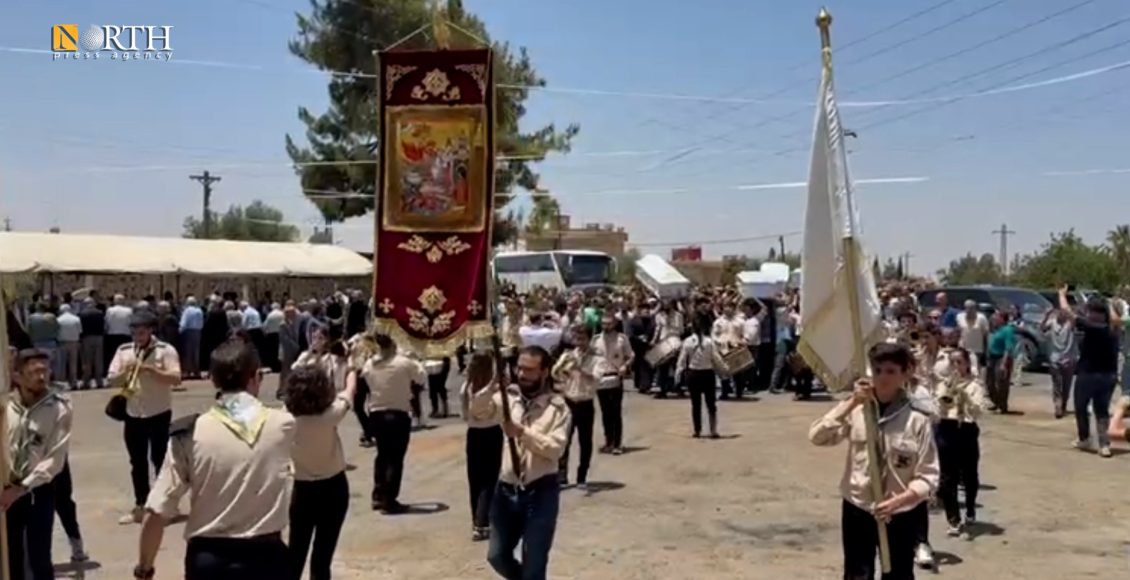Church attack turns prayer into mourning in Damascus
By Khalaf Ma’o
SUWAYDA, Syria (North Press) – In the al-Duwaila neighborhood of the Syrian capital, Damascus—a place long steeped in prayer and peace—an act of terror shattered the quiet. A bombing inside the Church of Mar Elias turned what was meant to be a solemn funeral mass into a scene of collective mourning.
On June 22, a suicide bombing during a church service killed 22 people and wounded 59 others, according to the latest figures from the Syrian Ministry of Health.
Rubble and remains
It was supposed to be a memorial service for a departed soul. The al-Bishara family had gathered at the church to pray for their late aunt. But within minutes of the hymns, everything changed: an explosion, gunfire, smoke—followed by rubble and human remains.
That’s how Loor al-Nasr, the wife of Georges al-Bishara—one of the victims—summarized the harrowing moment that would forever alter their family’s life.
“After the Gospel reading, we heard gunfire. We dropped to the floor under the pews,” she told North Press in her local dialect. “My husband and his brother, Boutros, were with us. We were all lying on the ground. Suddenly, he entered. He could see us, but we could not see him because we were under the pews. People rushed to stop him and force him out of the church because he was carrying a bomb and intended to detonate it.”
“My husband went up to him, struck his hand to make him drop the bomb then kicked it away from the crowd. Boutros tried to grab and restrain him to push him away. That is when he detonated the explosive belt, and we were all hit by the blast.”
Heroism in ashes
Thanaa Masoud, Boutros’ wife, said, “”Nothing remained of my husband, while from Georges, my husband’s brother, only the upper half of his body was found. But my husband Boutros… there was nothing left. He soared into the heavens. He left the House of God and ascended to heaven.”
Through her grief, she pleaded for a fragment of him—anything. “The pain is immense. It is unbearable that I could not find even a part of his body.”
We want justice
Hanna al-Bishara, brother of Georges and Boutros, was not in the church during the attack. He was in Beirut, bidding farewell to the same aunt the service was meant to honor. He rushed back to Damascus as soon as he heard the news.
He started running between hospitals, coffins, and body bags, searching for his brother Boutros, he said.
He found nothing. He even entered the forensic morgue and began examining black bags that held what remained of the victims, but still found no trace.
“My entire family were either dead or injured, including the heroes Boutros and Georges, who confronted death to push it away from others as much as they could.”
Hanna echoed the words of Patriarch John X Yazigi, head of the Greek Orthodox Church of Antioch, calling on Transitional President Ahmad al-Sharaa for accountability.
During the funeral, Patriarch Yazigi, the most senior Christian cleric in Syria, held President al-Sharaa’s government responsible for failing to protect minorities. He said that the president’s condolences were “not enough” at a time when religious minorities were increasingly anxious about the transitional government’s ability to ensure their safety.
U.S. State Department spokesperson Tammy Bruce also condemned the attack, calling on the Syrian transitional government to hold all perpetrators accountable and guarantee the safety of all Syrians, including religious and ethnic minorities.
She added that the U.S. continues to support the Syrian transitional government in its fight against forces seeking to spread instability and fear in their country and the region.

